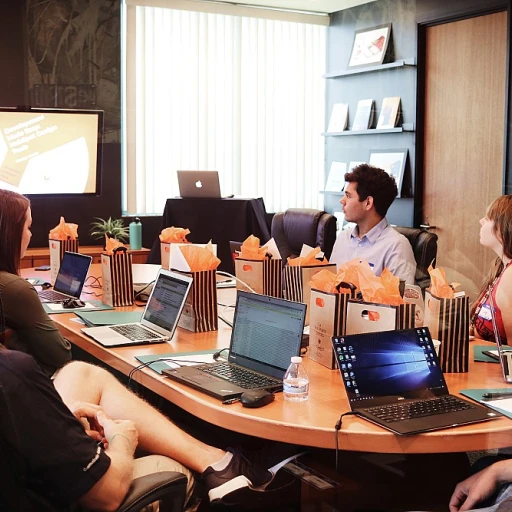Understanding the Learning-Driven Mindset
Developing a Mindset for Lifelong Learning
A learning-driven mindset is the foundation of successful reskilling. In an ever-evolving world, the days of relying solely on past education are behind us. Instead, cultivating an attitude that prioritizes continuous learning and curiosity has become essential. This approach is akin to teaching children the importance of discovery and exploration, elements that fuel both personal and professional growth.
Data shows that organizations that encourage a culture of continuous education often see a higher rate of innovation and adaptability. This is not only beneficial for the organization but also for the individuals who actively participate in lifelong learning. The goal is to create a learning environment that mirrors the playful and joyful atmosphere found in early education settings. By embracing a model of care education, businesses can focus on the growth and development of their workforce.
For educators and students alike, aspiring towards a learning-driven culture means setting clear teaching goals and crafting lesson plans that adapt to the needs of learners. Teachers play a vital role in shaping a discovery-driven approach, helping students of all ages view challenges as opportunities. Reskilling with purpose requires understanding the "why" behind learning—a philosophy that is very much at the heart of organizational learning.
Moreover, as you embark on your reskilling journey, consider the role of resources such as books and online courses that support driven learning. This personalized approach fosters the development of skills necessary for future-proof careers. To further elevate your skills, consider implementing a performance improvement plan as part of your overall strategy.
Identifying Skills for Future-Proof Careers
Pinpointing Skills That Stand the Test of Time
In today’s fast-paced world, where the concept of careers evolves at an unprecedented rate, identifying skills that are future-proof becomes essential. This is where a learning-driven perspective aids individuals in ensuring they remain relevant. Reskilling requires careful evaluation of the skills that add value not just to your personal growth, but also to the organization you are part of.
One of the crucial aspects involves a deeper understanding of what the labor market demands. Data has become the nucleus of most operations, playing a pivotal role in learning environments across different sectors, including business and education. Key competencies like problem-solving, driven learning, and data proficiency are becoming increasingly crucial. As early education lays much emphasis on playful inclusive and joyful playful methodologies, adults must similarly embrace discovery-driven methodologies that encourage ongoing education and innovation.
Looking at what businesses like Amazon prioritize can provide insight. It's clear they value adaptive skills that can transform challenges into opportunities. An organization’s success is often tied to its ability to pivot and adapt, emphasizing the need for a workforce that prioritizes discovery and continuous improvement.
Today’s professionals are much like students in a dynamic classroom. They engage with lesson plans designed for real-world applications, focusing on interactive learning that encourages growth. Advances in technology and early care education offer vast resources to not only equip adults with necessary skills but also foster an engaging culture where education is seen as an enjoyable, lifelong journey.
Setting personal and organizational learning goals in this context becomes vital. They help in navigating through various educational resources and books that provide actionable insights. For instance, mastering the art of improvisation in reskilling can further empower individuals to tailor their learning paths effectively.
Whether guided by traditional teaching techniques or modern technologies, aligning goals with a forward-thinking, learning-driven perspective ensures that skills acquired today remain as valuable as gold in the years to come.
Overcoming Challenges in Reskilling
Strategies to Navigate Reskilling Obstacles
Reskilling can present several challenges for individuals and organizations alike. Understanding and addressing these obstacles is crucial for achieving your
learning goals and fostering an environment that embraces continuous development.
- Access to Resources: One of the significant hurdles in reskilling is the availability of resources. Many individuals or businesses struggle to access quality learning materials or courses. Emphasizing discovery-driven learning, organizations can utilize existing internal knowledge and digital platforms to bridge this gap. Leveraging data available from various platforms, such as Amazon, can enhance the learning experience by providing curated content that aligns with critical market needs.
- Time Constraints: Another prevalent challenge is managing time effectively, especially when juggling other responsibilities like teaching, family, or business operations. Implementing a strategic approach where learning is integrated into daily routines can alleviate this pressure. For instance, crafting playful, inclusive lesson plans that blend with work or family activities can be an effective strategy.
- Motivation and Engagement: Maintaining sustained interest and drive in a long-term learning process can be daunting. To cultivate a joyful and playful learning environment, consider creating a support network involving peers or mentors. This can be particularly impactful for teachers and students, fostering an ecosystem of mutual motivation and shared goals.
- Setting Realistic Expectations: It's essential to establish achievable goals and manage expectations throughout the reskilling journey. Many individuals become disheartened when progress isn’t immediate. By setting incremental, realistic targets, you can create a structured pathway and celebrate small wins along the way, enhancing motivation and a sense of accomplishment.
- Building a Learning Community: Creating a network of like-minded individuals can significantly support reskilling efforts. An inclusive, discovery-driven business culture encourages shared learning experiences and fosters an enriched educational environment. Participation in organizational learning forums or group workshops can promote a broader view, assisting each 'child' or participant to build upon their unique knowledge base.
By understanding these challenges and implementing strategic approaches, individuals and businesses can create environments conducive to effective reskilling. This approach not only nurtures personal development but also contributes to a vibrant, learning-driven organization.
Leveraging Technology for Learning
Harnessing the Power of Technology in Learning
In the ever-evolving realm of education and business, leveraging technology to enhance learning is no longer a luxury—it's a necessity. The modern learning environment has undergone significant transformation, largely influenced by innovation in technology and data.
One might consider how platforms like Amazon have revolutionized the way we access and engage with knowledge, akin to a child discovering a world of possibilities in an enchanted library. This analogy extends into the realms of learning teaching, where teachers and students are both beneficiaries of a learning-driven approach. Driven learning, powered by advanced data analytics, provides crucial insights into individual progress and learning preferences.
Data-driven methodologies serve as a gold standard, helping organizations craft more effective lesson plans that cater to diverse learning needs. Whether it's early education or care education, the integration of technology facilitates a playful inclusive learning environment. This mirrors the ethos of discovery-driven learning—one that fosters joyful and playful engagement.
Business leaders have adopted a view that education does not stop at the classroom door. Corporate environments now serve as an extension of early care and educational playgrounds. Technology aids not just in the accumulation of knowledge but in its application, thus driving a learning-centered business culture. Consider the flourishing landscape of online learning resources and the proliferation of e-books. These platforms democratize education and support lifelong learners in achieving their goals.
Organizations are encouraged to adopt a driven business tactic to support their employees' education. Learning environments that blend problem-solving with technology create not just knowledgeable employees but critical thinkers ready to tackle real-world challenges.
Incorporating technological innovations with traditional methodologies results in a hybrid approach to teaching learning—a necessity in today's fast-paced world. As individuals and organizations embrace this, the path to mastering new skills becomes clearer and more efficient.
Creating a Personalized Learning Plan
Crafting Your Personalized Learning Pathway
In the realm of reskilling, embracing a discovery-driven learning approach offers a unique opportunity for career advancement. This journey necessitates careful planning and self-reflection to identify one's learning goals and pathways. At the heart of this approach is the ability to tailor a learning plan that aligns with your aspirations and the evolving demands of the marketplace.
Creating a personalized learning plan starts with understanding your current skillset. Evaluate your strengths, areas for improvement, and the skills that are in demand in today's data-driven and dynamic business environment. This requires a deep dive into your career goals and the roles you aspire to, aligning your learning with the skills required in those positions. Whether you are transitioning into a new industry or upskilling within your current role, having clear objectives will guide your learning journey.
To create a robust learning environment, consider incorporating resources that cater to diverse learning styles. Books, online courses, podcasts, and workshops are all excellent tools to expand your knowledge. Using resources from platforms that offer cutting-edge insights and education, like those offered by major tech companies, can provide valuable and up-to-date information.
Incorporating technology as part of your learning strategy is essential as it can offer a flexible and convenient way to acquire new skills. Mobile learning apps, interactive platforms, and data-driven insights from online resources offer innovative methods to stay engaged and informed. Educating yourself in a playful yet constructive manner can make the learning process more joyful and less daunting.
A personalized learning plan should not isolate you from others. Join communities that foster supportive interactions among students, teachers, and professionals within your area of interest. Engaging in peer discussions and collaborative projects not only broadens your view but also introduces you to diverse perspectives and problem-solving techniques. A vibrant and inclusive community serves as a gold mine for knowledge and can be crucial for maintaining motivation during your reskilling journey.
Ultimately, a successful personalized learning plan should adapt to your changing needs and align with both personal and organizational objectives. By setting achievable milestones and celebrating small victories, you create a sustainable and rewarding learning experience that equips you to navigate the evolving landscapes of work and business.
Nurturing a Culture of Collaborative Learning
Building a supportive learning community is crucial for any successful reskilling journey. As organizations and individuals embark on this transformative path, fostering an environment where collaboration and shared knowledge flourish becomes essential. This approach not only enhances the process of learning but also ensures that individuals feel valued and motivated.
Incorporating diverse perspectives is key to enriching any learning environment. Teachers, students, and business leaders alike bring different views to the table, facilitating a discovery-driven atmosphere where everyone contributes to problem-solving. This diversity is the gold in the realm of education, allowing for a more enriching and inclusive experience.
Creating a learning culture that is both playful and joyful can significantly impact the engagement and retention of new skills. In early education, the playful inclusive approach to teaching can be particularly effective. By treating each learning experience as a journey of child-like discovery, we create an environment that encourages continuous curiosity and willingness to embrace new information.
Organizational learning initiatives, much like the work of large businesses such as Amazon, can illustrate the benefits of data-driven strategies in reskilling. Employing a learning-driven methodology where data shapes the lesson plans and goals can lead to a more personalized approach to education while also catering to the unique needs of each learner or employee.
Moreover, learning environments should focus on the mutual benefits of collaboration and individual growth. By seeing each member as an integral part of the whole, and fostering goals that align with both personal and organizational aspirations, the collective growth is accelerated.
In conclusion, building a supportive learning community entails crafting an ecosystem where diverse views are respected, joyful learning is encouraged, and data-driven methods guide the overall process. This, coupled with a shared commitment to continuous improvement, will ensure that reskilling efforts are both joyful and fruitful.














